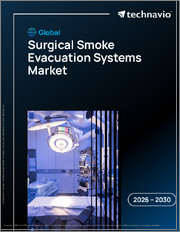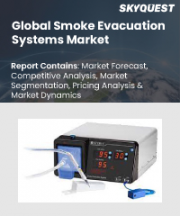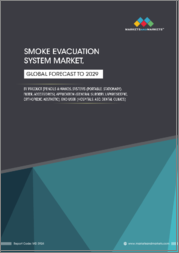
|
시장보고서
상품코드
1722461
배연 시스템 시장 보고서 : 제품, 용도, 최종사용자, 지역별(2025-2033년)Smoke Evacuation Systems Market Report by Product, Application, End User, and Region 2025-2033 |
||||||
2024년 배연 시스템 세계 시장 규모는 2억 1,290만 달러에 달했습니다. 향후 IMARC Group은 이 시장이 2033년까지 3억 4,530만 달러에 달하고, 2025-2033년 5.25%의 연평균 성장률(CAGR)을 보일 것으로 전망하고 있습니다. 이 시장은 수술용 배연 안전과 관련된 엄격한 규제, 수술용 배연과 관련된 건강 위험에 대한 인식 증가, 상당한 기술 발전, 최소 침습 수술의 채택 증가, 통합 배연 솔루션에 대한 수요 증가에 의해 주도되고 있습니다.
배연 시스템 시장 분석 :
주요 시장 성장 촉진요인 : 주요 시장 성장 촉진요인으로는 수술용 연기 안전에 대한 엄격한 규제, 수술용 연기와 관련된 건강 위험에 대한 인식 증가, 상당한 기술 발전 등이 있습니다.
주요 시장 동향 : 저침습 수술의 채택 확대, 통합형 배연 솔루션에 대한 수요 증가, 작업장 안전 표준에 대한 중요성 증가 등이 주요 시장 동향으로 꼽힙니다.
지리적 동향 : 북미는 탄탄한 의료 인프라, 작업장 안전을 촉진하는 엄격한 규제, 개발된 수술 기법 및 기술 사용 증가로 인해 가장 큰 시장 점유율을 차지하고 있습니다.
경쟁 구도: B.Braun Melsungen AG, CONMED Corporation, Danaher Corporation, Ecolab Inc. Olympus Corporation,Stryker Corporation,The Cooper Companies Inc.,Utah Medical Products Inc.,Zimmer Biomet 등이 배연 시스템 산업의 주요 기업입니다.
과제와 기회: 높은 시스템 비용과 엄격한 규제 준수 요구사항이 과제입니다. 반면, 배연 시스템 시장의 기회 요인으로는 미개척 지역에서의 주요 기업들의 급속한 확장을 들 수 있습니다.
배연 시스템 시장 동향 :
엄격한 규제 환경:
작업장 안전, 특히 의료 환경에서의 엄격한 규제가 증가함에 따라 배연 시스템에 대한 수요가 증가하고 있습니다. 미국의 OSHA(OCCUPATIONAL SAFETY AND HEALTH ADMINISTRATION)와 세계 각국의 유사한 규제 기관을 포함한 수많은 당국은 수술 연기 관련 위험을 피하기 위한 조치의 시행을 의무화하고 있습니다. 이 연기에는 돌연변이 유발 물질, 발암 물질, 감염성 물질과 같은 유해 물질이 포함되어 있어 환자와 의료진에게 심각한 건강 문제를 야기할 수 있습니다. 따라서 의료 시설은 이러한 규정을 준수하고 환자와 의료진의 건강을 보호하기 위해 효과적인 배연 시스템에 투자해야 합니다. 이 외에도, 코로나19의 갑작스러운 유행은 의료 기관에서 안전하고 건강한 작업 환경을 조성하는 것이 얼마나 중요한지 더욱 강조하고 있습니다. 수술 연기 매개 감염의 잠재적 전파 가능성에 대한 인식이 높아짐에 따라 배연 시스템에 대한 관심은 지속적으로 증가하고 있습니다.
최소침습 수술의 채택 증가:
의료기관에 대한 최소침습수술의 보급은 배연시스템 시장의 성장으로 이어지고 있습니다. 내시경 수술, 복강경 수술, 로봇 보조 수술과 같은 이러한 수술은 기존의 개복 수술에 비해 작은 절개창, 주변 조직에 대한 외상 감소, 짧은 회복 시간, 좋은 환자 결과 등 다양한 이점을 제공합니다. 2023년 529억 달러, 2032년 910억 달러에 달할 것으로 예상되며, 2024-2032년 CAGR은 6%를 보일 것으로 예측됩니다. 그러나 이러한 수술은 매우 적은 양의 연기를 발생시키기 때문에 수술 연기와 관련된 건강 위험이 발생할 수 있습니다. 따라서 환자와 의료 전문가에게 안전한 수술 환경을 조성하기 위해 효과적인 연기 배출 대책을 시행하는 것이 필수적입니다.
엄청난 기술 발전:
배연 기술의 획기적인 발전으로 인해 배연 시스템 시장 전망은 긍정적입니다. 주요 기업들은 특히 이러한 시스템의 효과, 효율성 및 사용자 경험을 향상시키기 위해 첨단 설계의 혁신과 도입에 주력하고 있습니다. 이러한 발전은 흡입력, 인체공학적 디자인, 여과 능력, 수술 장비 및 워크플로우와의 통합 등 다양한 측면에서 이루어지고 있습니다. 이 외에도 전기수술 기기 및 레이저 시스템과 같은 수술 장비에 효율적으로 통합되는 통합형 연기 배출 시스템의 출시가 시장 성장을 가속하고 있습니다. 이 외에도 수술 연기에서 유해물질과 오염물질을 제거하기 위한 여과 기술 활용에 대한 관심이 높아지고 있는 것도 배연 시스템 산업을 적극적으로 견인하고 있습니다.
목차
제1장 서문
제2장 조사 범위와 조사 방법
- 조사 목적
- 이해관계자
- 데이터 소스
- 1차 정보
- 2차 정보
- 시장 추정
- 보텀업 접근
- 톱다운 접근
- 조사 방법
제3장 주요 요약
제4장 서론
- 개요
- 주요 업계 동향
제5장 세계의 배연 시스템 시장
- 시장 개요
- 시장 실적
- COVID-19의 영향
- 시장 예측
제6장 시장 분석 : 제품별
- 배연 시스템
- 배연 펜슬
- 배연 필터
- 배연 튜브
- 배연 액세서리
제7장 시장 분석 : 용도별
- 복강경 수술
- 정형외과 수술
- 메디컬 에스테틱 성형외과
- 기타
제8장 시장 분석 : 최종사용자별
- 병원
- 외래수술센터(ASC)
- 미용성형센터
- 치과의원
- 기타
제9장 시장 분석 : 지역별
- 북미
- 미국
- 캐나다
- 아시아태평양
- 중국
- 일본
- 인도
- 한국
- 호주
- 인도네시아
- 기타
- 유럽
- 독일
- 프랑스
- 영국
- 이탈리아
- 스페인
- 러시아
- 기타
- 라틴아메리카
- 브라질
- 멕시코
- 기타
- 중동 및 아프리카
- 시장 내역 : 국가별
제10장 SWOT 분석
- 개요
- 강점
- 약점
- 기회
- 위협
제11장 밸류체인 분석
제12장 Porter의 Five Forces 분석
- 개요
- 바이어의 교섭력
- 공급 기업의 교섭력
- 경쟁 정도
- 신규 진출업체의 위협
- 대체품의 위협
제13장 가격 분석
제14장 경쟁 구도
- 시장 구조
- 주요 기업
- 주요 기업 개요
- B. Braun Melsungen AG
- CONMED Corporation
- Danaher Corporation
- Ecolab Inc.
- Erbe Elektromedizin GmbH
- Johnson & Johnson
- Medtronic plc
- Olympus Corporation
- Stryker Corporation
- The Cooper Companies Inc.
- Utah Medical Products Inc.
- Zimmer Biomet
The global smoke evacuation systems market size reached USD 212.9 Million in 2024. Looking forward, IMARC Group expects the market to reach USD 345.3 Million by 2033, exhibiting a growth rate (CAGR) of 5.25% during 2025-2033. The market is propelled by strict regulations associated with surgical smoke safety, increasing awareness about health risks related to surgical smoke, significant technological advancements, rising adoption of minimally invasive surgeries, and growing demand for integrated smoke evacuation solutions.
Smoke Evacuation Systems Market Analysis:
Major Market Drivers: Some of the major market drivers include strict regulations associated with surgical smoke safety, increasing awareness about the health risks related to surgical smoke, and significant technological advancements.
Key Market Trends: Growing adoption of minimally invasive surgeries, increasing demand for integrated smoke evacuation solutions, and increasing emphasis om workplace safety standards are some of the major market trends.
Geographical Trends: North America holds maximum number of shares on account of the robust healthcare infrastructure, strict regulations which promote workplace safety, and rising utilization of developed surgical techniques and technologies.
Competitive Landscape: B. Braun Melsungen AG, CONMED Corporation, Danaher Corporation, Ecolab Inc., Erbe Elektromedizin GmbH, Johnson & Johnson, Medtronic plc, Olympus Corporation, Stryker Corporation, The Cooper Companies Inc., Utah Medical Products Inc. and Zimmer Biomet, are among some of the key players in the smoke evacuation systems industry.
Challenges and Opportunities: High cost of the systems and stringent regulatory compliance requirements are some of the challenges. Whereas, smoke evacuation systems market opportunities include rapid expansion of key players in untapped regions.
Smoke Evacuation Systems Market Trends:
Stringent Regulatory Environment:
The rising number of stringent regulations in association with workplace safety, specifically in healthcare settings, is propelling the smoke evacuation systems demand. There are numerous authorities such as OSHA (OCCUPATIONAL SAFETY AND HEALTH ADMINISTRATION) in the United States and similar regulatory bodies globally have necessitated the implementation of measures so as to avoid the risks related to surgical smoke. This smoke possesses toxic substances including mutagens, carcinogens, and infectious agents which cause serious health issues to patients and healthcare professionals. On account of this, healthcare facilities are impelled to invest in effective smoke evacuation systems so as to ensure compliance with these regulations and protect the well-being of their patients and team. Other than this, the sudden outbreak of the COVID-19 pandemic is further underlining the importance of leading a safe and healthy working environment in healthcare organizations. As the awareness about the potential transmission of infectious agents through surgical smoke increases, the focus need for smoke evacuation systems is constantly propelling.
Increasing Adoption of Minimally Invasive Surgeries:
The rising acceptance of minimally invasive surgeries throughout medical organizations is leading to a positive smoke evacuation systems market growth. These surgeries such as endoscopy, laparoscopy, and robotic-assisted surgery, offer a wide range of advantages in comparison to conventional open surgeries, such as smaller incisions, lesser trauma to surrounding tissues, lesser recovery times, and better patient results. According to the IMARC GROWTH, the global minimally invasive surgery market has reached US$ 52.9 Billion in 2023, and is expected to reach US$ 91.0 Billion by 2032, exhibiting a CAGR of 6% during 2024-2032. Nevertheless, these surgeries produce minimal amount of smoke, which poses possible health risks related to surgical smoke. On account of this, the implementation of effective smoke evacuation measures so as to create a safe operating environment for patients and healthcare professionals, becomes mandatory.
Significant Technological Advancements:
The significant development of smoke evacuation technology is creating a positive smoke evacuation systems market outlook. Key players are particularly focusing on innovating and introducing advanced designs so as to improve the efficacy, efficiency, and user experience of these systems. These advancements possess numerous manifolds, such as suction power, ergonomic design, filtration abilities, and integration with surgical equipment and workflows. Other than this, the launch of integrated smoke evacuation systems that are efficiently included into surgical devices, including electrosurgical units and laser systems is propelling the market growth. Besides this, the increasing focus on the utilization of filtration technologies to eliminate hazardous substances and contaminants from surgical smoke are positively driving the smoke evacuation system industry.
Smoke Evacuation Systems Industry Segmentation:
Breakup by Product:
- Smoke Evacuating Systems
- Smoke Evacuation Pencils
- Smoke Evacuation Filters
- Smoke Evacuation Tubing
- Smoke Evacuation Accessories
Smoke evacuating systems accounts for the majority of the market share
The smoke evacuating systems market report has provided a detailed breakup and analysis of the market based on the product. This includes smoke evacuating systems, smoke evacuation pencils, smoke evacuation filters, smoke evacuation tubing, and smoke evacuation accessories. According to the report, smoke evacuating systems represented the largest segment.
Smoke evacuating systems hold maximum number of shares on account of their vital role in safeguarding the well-being of healthcare professionals and patients during surgical processes. Additionally, as the awareness about risks related to surgical smoke increases, healthcare organizations are emphasizing on the implementation of a sturdy smoke evacuation solution so as to comply with stringent regulatory standards and avert risks caused due to toxic airborne elements. These systems provide extensive smoke capture and filtration capabilities, catering to the rising need for effective smoke management in varied surgical environments, thereby creating a positive smoke evacuating systems market overview.
Breakup by Application:
- Laparoscopic Surgeries
- Orthopedic Surgeries
- Medical Aesthetic Surgeries
- Others
Laparoscopic surgeries hold the largest share in the industry
Laparoscopic surgeries hold the maximum market share as they are less invasive as compared to traditional open surgeries. Other than this, significant developments in laparoscopic techniques and instruments have led to an increased demand of these procedures which can be performed through minimally invasive approaches, such as appendectomy, cholecystectomy, and hernia repair. Moreover, the increasing utilization of laparoscopy across numerous medical specialties including urology, gynecology, and gastroenterology is further creating positive smoke evacuation systems market forecast.
Breakup by End User:
- Hospitals
- Ambulatory Surgery Centers
- Cosmetic Surgery Centers
- Dental Clinics
- Others
Hospitals represents the leading market segment
Hospitals dominate the market as they act as the primary healthcare delivery infrastructure, performing a wide array of surgical procedures across numerous medical specializations. Hospitals possess a significant demand for these systems so as to ensure the safety of their patients and healthcare workers during surgical procedures. Other than this, they possess operating rooms in specific with advanced surgical equipment, where these systems service as a vital component for maintaining a clean and safe surgical environment. Moreover, the increasing number of surgeries being performed in hospitals are contributing to the smoke evacuation systems market revenue.
Breakup by Region:
- North America
- United States
- Canada
- Asia-Pacific
- China
- Japan
- India
- South Korea
- Australia
- Indonesia
- Others
- Europe
- Germany
- France
- United Kingdom
- Italy
- Spain
- Russia
- Others
- Latin America
- Brazil
- Mexico
- Others
- Middle East and Africa
North America leads the market, accounting for the largest smoke evacuation systems market share
The market research report has also provided a comprehensive analysis of all the major regional markets, which include North America (the United States and Canada); Asia Pacific (China, Japan, India, South Korea, Australia, Indonesia, and others); Europe (Germany, France, the United Kingdom, Italy, Spain, Russia, and others); Latin America (Brazil, Mexico, and others); and the Middle East and Africa. According to the report, North America accounted for the largest market share.
North America dominates the market on account of its robust healthcare infrastructure, which possesses advanced medical facilities, good-quality healthcare services, and a rigid regulatory framework which fosters workplace safety standards. Other than this, the increasing awareness about the health risks associated with surgical smoke is further propelling the market growth. Besides this, smoke evacuation systems market developments in confluence with the culture of innovation within the healthcare industry are positively the influencing the market growth.
Competitive Landscape:
The market research report has also provided a comprehensive analysis of the competitive landscape in the market. Detailed profiles of all major companies have also been provided. Some of the major smoke evacuation systems companies include B. Braun Melsungen AG, CONMED Corporation, Danaher Corporation, Ecolab Inc., Erbe Elektromedizin GmbH, Johnson & Johnson, Medtronic plc, Olympus Corporation, Stryker Corporation, The Cooper Companies Inc., Utah Medical Products Inc. and Zimmer Biomet.
(Please note that this is only a partial list of the key players, and the complete list is provided in the report.)
Key players in the smoke evacuation systems industry are consistently innovating to enhance product efficacy, safety, and user experience. They invest heavily in research and development to introduce advanced technologies such as integrated smoke evacuation solutions, improved filtration systems, and ergonomic designs. They are also focusing on expanding their global footprint through strategic partnerships, acquisitions, and product launches targeting specific market segments. Moreover, they actively engage with healthcare professionals and regulatory authorities to advocate for the adoption of best practices and standards for surgical smoke evacuation, ensuring continuous smoke evacuation systems market recent development and advancement within the industry.
Latest News:
May 24: As published by ACS Focus, three more states-Minnesota, Virginia and West Virginia-have adopted surgical smoke evacuation requirements for ASCs and hospitals in the 2024 legislative session.
Key Questions Answered in This Report
- 1.What was the size of the global smoke evacuation systems market in 2024?
- 2.What is the expected growth rate of the global smoke evacuation systems market during 2025-2033?
- 3.What are the key factors driving the global smoke evacuation systems market?
- 4.What has been the impact of COVID-19 on the global smoke evacuation systems market?
- 5.What is the breakup of the global smoke evacuation systems market based on the product?
- 6.What is the breakup of the global smoke evacuation systems market based on the application?
- 7.What is the breakup of the global smoke evacuation systems market based on the end user?
- 8.What are the key regions in the global smoke evacuation systems market?
- 9.Who are the key players/companies in the global smoke evacuation systems market?
Table of Contents
1 Preface
2 Scope and Methodology
- 2.1 Objectives of the Study
- 2.2 Stakeholders
- 2.3 Data Sources
- 2.3.1 Primary Sources
- 2.3.2 Secondary Sources
- 2.4 Market Estimation
- 2.4.1 Bottom-Up Approach
- 2.4.2 Top-Down Approach
- 2.5 Forecasting Methodology
3 Executive Summary
4 Introduction
- 4.1 Overview
- 4.2 Key Industry Trends
5 Global Smoke Evacuation Systems Market
- 5.1 Market Overview
- 5.2 Market Performance
- 5.3 Impact of COVID-19
- 5.4 Market Forecast
6 Market Breakup by Product
- 6.1 Smoke Evacuating Systems
- 6.1.1 Market Trends
- 6.1.2 Market Forecast
- 6.2 Smoke Evacuation Pencils
- 6.2.1 Market Trends
- 6.2.2 Market Forecast
- 6.3 Smoke Evacuation Filters
- 6.3.1 Market Trends
- 6.3.2 Market Forecast
- 6.4 Smoke Evacuation Tubing
- 6.4.1 Market Trends
- 6.4.2 Market Forecast
- 6.5 Smoke Evacuation Accessories
- 6.5.1 Market Trends
- 6.5.2 Market Forecast
7 Market Breakup by Application
- 7.1 Laparoscopic Surgeries
- 7.1.1 Market Trends
- 7.1.2 Market Forecast
- 7.2 Orthopedic Surgeries
- 7.2.1 Market Trends
- 7.2.2 Market Forecast
- 7.3 Medical Aesthetic Surgeries
- 7.3.1 Market Trends
- 7.3.2 Market Forecast
- 7.4 Others
- 7.4.1 Market Trends
- 7.4.2 Market Forecast
8 Market Breakup by End User
- 8.1 Hospitals
- 8.1.1 Market Trends
- 8.1.2 Market Forecast
- 8.2 Ambulatory Surgery Centers
- 8.2.1 Market Trends
- 8.2.2 Market Forecast
- 8.3 Cosmetic Surgery Centers
- 8.3.1 Market Trends
- 8.3.2 Market Forecast
- 8.4 Dental Clinics
- 8.4.1 Market Trends
- 8.4.2 Market Forecast
- 8.5 Others
- 8.5.1 Market Trends
- 8.5.2 Market Forecast
9 Market Breakup by Region
- 9.1 North America
- 9.1.1 United States
- 9.1.1.1 Market Trends
- 9.1.1.2 Market Forecast
- 9.1.2 Canada
- 9.1.2.1 Market Trends
- 9.1.2.2 Market Forecast
- 9.1.1 United States
- 9.2 Asia-Pacific
- 9.2.1 China
- 9.2.1.1 Market Trends
- 9.2.1.2 Market Forecast
- 9.2.2 Japan
- 9.2.2.1 Market Trends
- 9.2.2.2 Market Forecast
- 9.2.3 India
- 9.2.3.1 Market Trends
- 9.2.3.2 Market Forecast
- 9.2.4 South Korea
- 9.2.4.1 Market Trends
- 9.2.4.2 Market Forecast
- 9.2.5 Australia
- 9.2.5.1 Market Trends
- 9.2.5.2 Market Forecast
- 9.2.6 Indonesia
- 9.2.6.1 Market Trends
- 9.2.6.2 Market Forecast
- 9.2.7 Others
- 9.2.7.1 Market Trends
- 9.2.7.2 Market Forecast
- 9.2.1 China
- 9.3 Europe
- 9.3.1 Germany
- 9.3.1.1 Market Trends
- 9.3.1.2 Market Forecast
- 9.3.2 France
- 9.3.2.1 Market Trends
- 9.3.2.2 Market Forecast
- 9.3.3 United Kingdom
- 9.3.3.1 Market Trends
- 9.3.3.2 Market Forecast
- 9.3.4 Italy
- 9.3.4.1 Market Trends
- 9.3.4.2 Market Forecast
- 9.3.5 Spain
- 9.3.5.1 Market Trends
- 9.3.5.2 Market Forecast
- 9.3.6 Russia
- 9.3.6.1 Market Trends
- 9.3.6.2 Market Forecast
- 9.3.7 Others
- 9.3.7.1 Market Trends
- 9.3.7.2 Market Forecast
- 9.3.1 Germany
- 9.4 Latin America
- 9.4.1 Brazil
- 9.4.1.1 Market Trends
- 9.4.1.2 Market Forecast
- 9.4.2 Mexico
- 9.4.2.1 Market Trends
- 9.4.2.2 Market Forecast
- 9.4.3 Others
- 9.4.3.1 Market Trends
- 9.4.3.2 Market Forecast
- 9.4.1 Brazil
- 9.5 Middle East and Africa
- 9.5.1 Market Trends
- 9.5.2 Market Breakup by Country
- 9.5.3 Market Forecast
10 SWOT Analysis
- 10.1 Overview
- 10.2 Strengths
- 10.3 Weaknesses
- 10.4 Opportunities
- 10.5 Threats
11 Value Chain Analysis
12 Porters Five Forces Analysis
- 12.1 Overview
- 12.2 Bargaining Power of Buyers
- 12.3 Bargaining Power of Suppliers
- 12.4 Degree of Competition
- 12.5 Threat of New Entrants
- 12.6 Threat of Substitutes
13 Price Analysis
14 Competitive Landscape
- 14.1 Market Structure
- 14.2 Key Players
- 14.3 Profiles of Key Players
- 14.3.1 B. Braun Melsungen AG
- 14.3.1.1 Company Overview
- 14.3.1.2 Product Portfolio
- 14.3.1.3 SWOT Analysis
- 14.3.2 CONMED Corporation
- 14.3.2.1 Company Overview
- 14.3.2.2 Product Portfolio
- 14.3.2.3 Financials
- 14.3.2.4 SWOT Analysis
- 14.3.3 Danaher Corporation
- 14.3.3.1 Company Overview
- 14.3.3.2 Product Portfolio
- 14.3.3.3 Financials
- 14.3.4 Ecolab Inc.
- 14.3.4.1 Company Overview
- 14.3.4.2 Product Portfolio
- 14.3.4.3 Financials
- 14.3.4.4 SWOT Analysis
- 14.3.5 Erbe Elektromedizin GmbH
- 14.3.5.1 Company Overview
- 14.3.5.2 Product Portfolio
- 14.3.6 Johnson & Johnson
- 14.3.6.1 Company Overview
- 14.3.6.2 Product Portfolio
- 14.3.6.3 Financials
- 14.3.6.4 SWOT Analysis
- 14.3.7 Medtronic plc
- 14.3.7.1 Company Overview
- 14.3.7.2 Product Portfolio
- 14.3.7.3 Financials
- 14.3.7.4 SWOT Analysis
- 14.3.8 Olympus Corporation
- 14.3.8.1 Company Overview
- 14.3.8.2 Product Portfolio
- 14.3.8.3 Financials
- 14.3.8.4 SWOT Analysis
- 14.3.9 Stryker Corporation
- 14.3.9.1 Company Overview
- 14.3.9.2 Product Portfolio
- 14.3.9.3 Financials
- 14.3.9.4 SWOT Analysis
- 14.3.10 The Cooper Companies Inc.
- 14.3.10.1 Company Overview
- 14.3.10.2 Product Portfolio
- 14.3.10.3 Financials
- 14.3.10.4 SWOT Analysis
- 14.3.11 Utah Medical Products Inc.
- 14.3.11.1 Company Overview
- 14.3.11.2 Product Portfolio
- 14.3.11.3 Financials
- 14.3.12 Zimmer Biomet
- 14.3.12.1 Company Overview
- 14.3.12.2 Product Portfolio
- 14.3.12.3 Financials
- 14.3.12.4 SWOT Analysis
- 14.3.1 B. Braun Melsungen AG



















